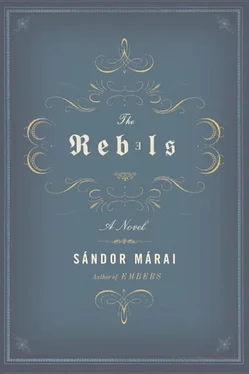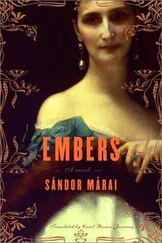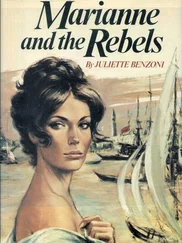He recalled two specific occasions in the room. One of them underlay every memory involving his father. He would have been four or five years old, sitting on the floor of this room, playing. His father steps in, sits down beside him on the floor, and without further ado begins to sing:
…Au clair de la Lune
Mon ami Pierrot…
He knows the song. Etelka has taught it to him. His father’s mouth opens and closes, the face is curiously twisted as it laughs, the song emerges from between those enormous teeth with a kind of whimsical childish lisp. He immediately understands that his father wants to put everything right, all that had passed between them from the moment of his birth, the silence, the isolation, the distance, the magic spell under which they had hitherto lived together; this single gesture is to release them from it, that’s what this sitting beside him and singing in such whimsical manner is about. Has he gone mad? he wonders. His father’s voice is losing confidence. He is still singing:
…Non, je ne prête pas ma plume
À un vieux savetier…
but then he stops and they are left staring into each other’s eyes. There is a statue in the main square, an enormous bronze soldier, pointing his rifle at the tyrant’s chest: it’s as if the soldier had leapt off its plinth, fully armed and uniformed, and was running along on all fours. Vieux savetier…, he repeats, his lips trembling, to console his father for whom he now feels a terrible pity. He starts crying. His father slowly gets to his feet, goes to the table, rummages among his books as if searching for something, notices that the child is watching him even through his tears, shrugs his shoulders, and hurries out of the room. For a long time after this they are like two people joined by a lie that degrades them both: their eyes do not meet.
Much later, some ten years later. Father is sitting at his table examining a slide under the table lamp when the boy enters. It’s an early afternoon in winter. The boy stops in the half-light but the father extends his hands towards him and invites him to come closer. There is some dry blue matter between the two sheets of glass, something with blotches and lines on it, like the map of the country he sees in his geography book. The father’s bony finger is following the lines of this peculiar map, moving along its branches, its curves, carefully tracing every kink of one particularly sinuous line, and where the line, somewhere near the edge of the slide, breaks, he taps at the glass.
It is my most beautiful slide, says his father.
The boy knows that his father’s finger is moving over a section of a brain. The image is full of variety, of dangerous, restless twists and turns. “What a map!” he thinks. His father bends close to the sheet of glass, the light intensely illuminating his face whose expression is of agonized, helpless curiosity, transforming his normally self-disciplined gaze into a mask that is almost grotesque. Involuntarily, he too leans closer. His father’s finger is delicately, circuitously following some point in the image where the crooked line gathers into a knot, then moves off in several directions. Like a cartographer who cannot quite orientate himself on a strange map, like a doctor feeling round a body to discover the secret of a diseased organ, he is helpless and impatient.
This was a Ruthenian peasant, his father explains, preoccupied. One day he slaughtered his entire family. His parents, his wife, and his two children. It is my most beautiful slide.
He bends over the dried-up blue substance. His father’s face clears: it is no longer full of painful tense curiosity, it empties, loses expression, the bony hand pushes away the slide and two pairs of eyes look blankly in front of them.
In the evening his father played the violin. He played the violin every night and no one was allowed into the room while he was playing. After supper he would retreat into his room and spend an hour wrestling with the obstinate, rebellious instrument, conjuring a set of tortured sounds from it. His father had never been taught the violin and some kind of shyness and embarrassment prevented him from taking lessons now. His playing was riddled with errors, and entailed, or so the boy felt, a kind of bad faith. He himself knew his efforts were a hopeless, obstinate experiment, and he couldn’t bear it if anyone made a pointed remark about it in his presence. Nevertheless the tortured sounds of his violin filled the house. The awareness of his father’s increasing embitterment as night after night, alone in his room, he struggled with the instrument, made him feel as if his father were engaged in some ugly, shameful habit in the solitude of his room while being overheard by the other gleefully malevolent dwellers in the house. At such times he too would lock himself in his room, sitting in the dark, his hands over his ears, biting his lips, staring and waiting. It was as if his father were doing something low and treacherous. Now the violin lay on top of the cupboard.
When he imagined his father’s death it was like an avalanche. Nothing unusual had happened to him so far, except for the fact that he was more silent than usual when he came back on leave.
Automatically bowing in the direction of the writing desk, he clapped his hat on his head and left the room.
HE MET HIS AUNT IN THE STAIRWELL. SHE WASdressed in her Sunday best, and groaned as she stopped. They kissed each other. She encouraged him to put a coat on and not be back too late. For a second he entertained the possibility of sinking to his knees and telling her everything.
The stairwell curved in a half circle with wide steps, and with its engravings of the town’s old public buildings gave an impression of grandeur. The stair carpet was of a multicolored folk design. The verandah had once served as his father’s waiting room and was soaked through with the smell of other people, the sickening, pungent iodine-and-ether smell of his father’s medicine cupboard only faintly detectable through it. Ernõ’s father smelled of flour paste and raw leather. Béla’s walked around in a haze of eastern spices, herring, and leftover fresh fruit. Tibor’s house was discreetly scented with lavender, the smell of genteel poverty and sickness, combined with the rather more combative smell of cured leather. Smells characteristic of their fathers’ occupations filled their homes. Ábel always thought of his own house in terms of the sobering light trance of ether, a mixture of acid and narcotic.
And so each nook and cranny of the house lived on in him, sorted according to smell, and providing he followed the magnetic needle of scent he could imagine each room with its own life. His aunt kept her arcanum of a hundred domestic substances—turpentine, benzine, chlorine, petroleum, a large quantity of each since they were rare items in the shops—in the dark corridor between kitchen and dining room. She was just returning from one of her secretive household expeditions. She was carrying her booty of two kilos of starch, rice, and freshly roasted coffee in her crocheted shopping bag. Her black hat, with its short veil in permanent mourning for some unknown deceased acquaintance, was perched on the topknot of her hair. Her sharp yellow nose felt cold against the boy’s face. Etelka entered the house like a guest or a distant relative who was only making a brief visit—and, after his mother’s death, had somehow remained there like a servant, a mother substitute, unpaid, always steadfast and ready to leave at the drop of a hat. Ábel loved her. She was “the other world” as he called her, and he loved her because she spoke softly and attached herself to them, to both of them, to father and son, with all the inexhaustible and ruthless love of the barren and constructed her life around them. She was the sort of old maid who kept people instead of dogs and cats for pets. Ábel knew that Etelka would happily give her life for him. It was a long time since they had been able to bring themselves to talk to each other. With each day that passed that low, oppressive, one-story dwelling was becoming ever more like a hothouse. There was something steamed up, close, and damp about it. Its yellow walls sank under the weight of its double roof. Red guttering framed the yellow façade and the gate, from both sides of which hung cast-iron lamps, lacquered green. Even the garden, that tiny old urban patch of grass, with its minimal cramped proportions, felt like a terrarium. Tall fire walls surrounded it on three sides. In the summer it was densely overgrown with lush weeds. The three of them, Etelka, Father, and Ábel, had lived there, in that house and in that garden, in utter seclusion since the death of his mother, with an occasional, rare change of servants. Later Ábel wondered if Etelka nursed some feelings for his father, if there had been a time when there was more than she let on in her heightened devotion to him. But no one ever spoke of that. He too only recalled it the way one remembers something that has failed to happen, like some mood before a potential shower in childhood, when the room darkens for a moment but no downpour follows the vexed dark that is immediately dispelled by the sun. Only the sensation of waiting remains embedded in the nerves.
Читать дальше












